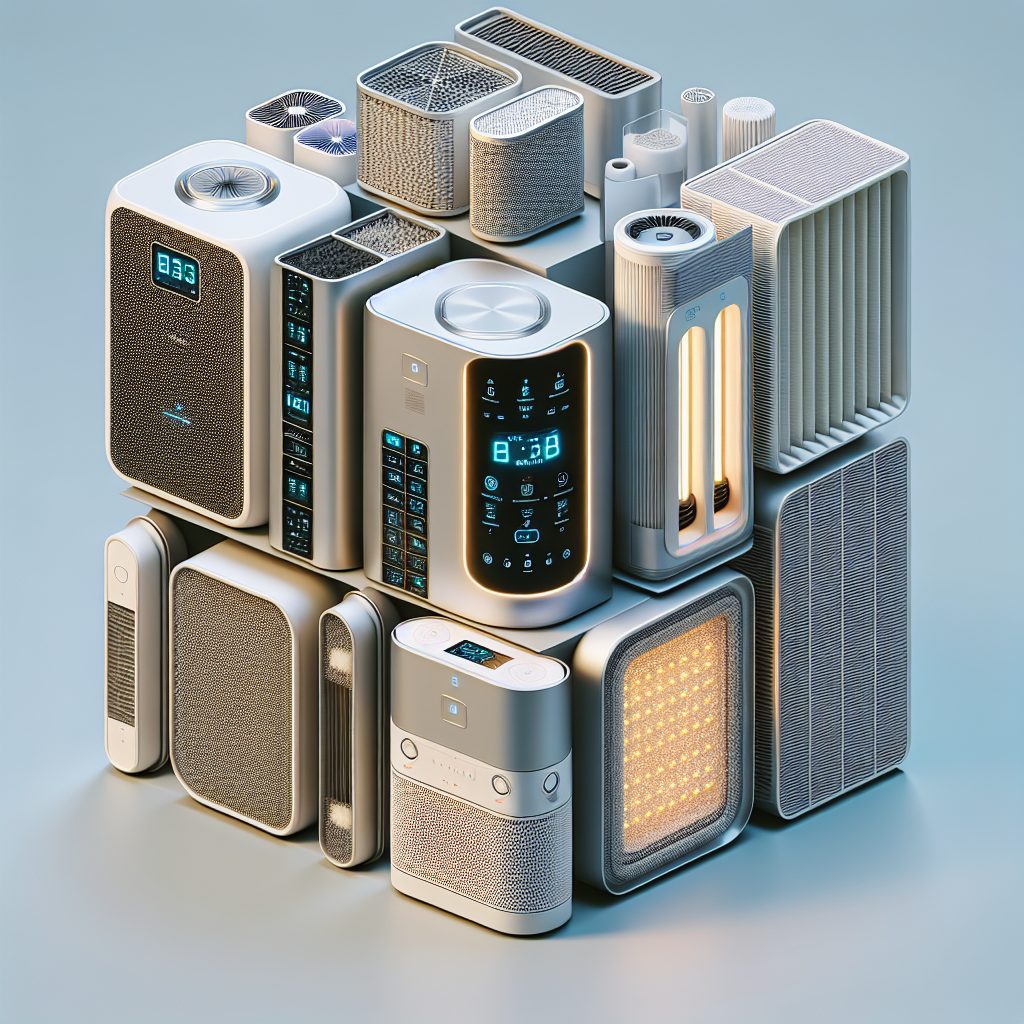
Home air purifiers are designed to remove airborne particles and pollutants from indoor air. They use sophisticated filtration technologies to capture pollen, dust, animal dander, and other allergens. By improving air quality, they can also help reduce the effects of asthma, allergies, and eczema. As air quality becomes increasingly important, home air purifiers have become more popular and available to consumers.
Modern home air purifiers boast simplified operation with adjustable settings, efficient filtration, and even app connectivity, enabling users to monitor and adjust air filtration as needed. In fact, some air purifiers can even detect airborne particles and automatically adjust to optimum settings. In addition, home air purifiers can cover large rooms with multiple filters for improved air flow throughout the house. In the next part of this article, we’ll take a deeper look at the key benefits of investing in a home air purifier.
Key Takeaways
1. Home air purifiers help to improve indoor air quality by removing pollutants such as dust, debris, pet dander, pollen, smoke, and other particles from the air.
2. They come in a variety of styles including throughout-the-room models, portable units, and whole-house systems.
3. They can be used to reduce exposure to allergens or other irritants, help reduce odors, and help keep the indoor air in your home cleaner.
4. Although there is no medical evidence that air purifiers can prevent or reduce the symptoms of illnesses such as asthma or allergies, some studies have shown that they can help improve indoor air quality.
5. It’s important to note that air purifiers are not a substitute for regular maintenance, cleaning, and ventilation of indoor spaces.
What Are the Benefits of Home Air Purifiers?
Home air purifiers are devices that are designed to cleanse and filter the air inside your home. They are useful for anyone looking to reduce allergens, smoke, dust, pollen, and other airborne particles. They can also improve indoor air quality, reduce energy costs, and make for a healthier living space.
Types of Home Air Purifiers
There are several types of air purifiers available for home use, including air filters, ionizers, ozone-generating purifiers, and ultraviolet light purifiers. Air filters use activated carbon or other media that traps particles as air passes through them, while ionizers disperse electromagnetic particles into the air to reduce or eliminate allergens and other particles. Ozone-generating purifiers use ultraviolet light to break down airborne particles into harmless molecules, and ultraviolet light purifiers emit ultraviolet light that breaks down mold and bacteria, reducing levels of allergens in the surrounding air.
How to Choose the Right Home Air Purifier
When choosing an air purifier for your home, consider the size of the space you want to purify, as well as the type of particles you want your purifier to filter. The performance of an air purifier will vary based on the size of the space, as well as the number and types of particles it is designed to remove. You should also consider the type of filter the purifier uses. Some of the more popular filters used in air purifiers are HEPA filters, activated carbon filters, and micro-allergen filters.
It can also help to read customer reviews and compare prices to ensure you are getting the best deal. Some purifiers also come with additional features, such as a timer, remote control, and digital display, that may enhance your experience.
How to Use a Home Air Purifier
After you have chosen an air purifier, set it up in the room you want to purify. Most purifiers should be placed at least eight inches away from walls and other obstructions, and make sure that there is a direct line between the purifier and the source of the air. Plug the purifier into a suitable power outlet, and press the power button to turn it on.
Many purifiers come with a filter indicator that will indicate when the filter needs to be changed. It is important to replace the filter regularly to ensure the best performance.
Tips for Maintaining a Home Air Purifier
1. To get the most out of an air purifier, it is important to clean and maintain it on a regular basis.
2. Make sure to dust off the exterior of the purifier regularly, and also check any fans or filters to ensure they are clean.
3. Every 3-6 months, check the filter and replace it if necessary.
4. To maximize efficiency, make sure the purifier is situated in a clean, open environment and unobstructed by furniture or other objects.
5. Do not run the purifier constantly – short, frequent intervals are preferable as opposed to long, continuous operation.
6. If you notice any changes in the performance of the purifier, make sure to contact the manufacturer for troubleshooting advice.
7. If you are using an ozone purifier, make sure to use it only in unoccupied rooms since ozone can be dangerous to people.
What Are Home Air Purifiers?
Home air purifiers are devices that help to improve the air quality in a home. It is important to select an air purifier that provides the best air purification for your specific environment. It works by trapping pollutants, odors, and other airborne ultra-fine particles, as well as purifying the air by removing harmful bacteria and viruses. Home air purifiers are designed to filter out the impurities in the air while letting in the fresh air that is essential for good health.
How Does Home Air Purifier Work?
Home air purifiers use various filters to capture and remove pollutants, allergens, smoke particles, and other particles from the air. It works by running air through a series of filters to scrub them of any impurities. Most home air purifiers have a pre-filter and a HEPA filter. The first traps large particles, while the second traps much smaller particles, up to 0.3 microns. The air is then scrubbed by passing it through an activated carbon filter or an ozone generator, which removes odors, smoke, and chemical vapors.
What Are The Benefits of Home Air Purifiers?
Home air purifiers can improve the air quality of your home significantly. They can reduce the presence of common allergens such as dust mites, pet dander, mold spores, and pollen, as well as other hazardous pollutants like formaldehyde, benzene, and other VOCs. Additionally, home air purifiers can reduce the levels of unpleasant odors in a home and help improve respiratory health.
What Pollutants Do Home Air Purifiers Remove?
Home air purifiers can remove a variety of air pollutants, such as dust, smoke, pollen, odors, dander, pet hair, formaldehyde, VOCs, and other tiny particles. It is important to choose the right air purifier for your specific needs as some air purifiers are better than others in removing certain pollutants.
What Is The Difference Between an Air Purifier and an Air Cleaner?
An air purifier is designed to remove pollutants and particulates from the air, whereas an air cleaner is designed to reduce levels of environmental allergens such as dust mites and pet dander. Air purifiers can also reduce the effects of smoke and odors, while air cleaners are not designed to do so. It is important to understand your specific needs when choosing the right air purification device.
What Are The Different Types of Home Air Purifiers?
There are a variety of home air purifiers to choose from, including HEPA filters, activated carbon filters, ionic purifiers, ultraviolet filters, and ozone generators. The type ofFilter is selected based on the pollutant to be removed. For example, a HEPA Filter is used to capture very small particles, while an activated carbon filter removes odor and chemical vapors.
Do Home Air Purifiers Produce Any Noise?
The amount of noise produced by a home air purifier will vary depending on the size and type of purifier. Generally, larger units tend to be louder than smaller ones. Many purifiers also feature noise reduction features to ensure quiet operation.
Are Home Air Purifiers Energy Efficient?
Yes, home air purifiers are energy efficient, and some models use up to 70% less energy than traditional HVAC systems. Most modern air purifiers also come with a range of features to improve energy efficiency such as auto shut-off, timers, and sleep modes.
What Is The Best Home Air Purifier?
The best home air purifier will depend on your specific needs. It is important to consider the size of the room, the types of pollutants to be removed, and your budget when selecting an air purifier. Make sure to research various models before making your purchase.
How Often Should You Change The Filters On Your Home Air Purifier?
The frequency of filter changes on home air purifiers depends on the model, the type of filter, and the amount of pollutants in the air. Generally, you should check the filters every few months and replace them when necessary. It is also important to clean or replace the air filter regularly to ensure good air quality.
Final Thought
Home air purifiers can be a great addition to any home, as they can help improve air quality and reduce the presence of common allergens and pollutants. It is important to determine your specific needs before making your selection to ensure you choose the best air purifier for your home and budget.
Once a home air purifier is installed, regular filter maintenance is essential to ensure good air quality. Make sure to check the filters regularly and clean or replace them as necessary for optimal performance.



